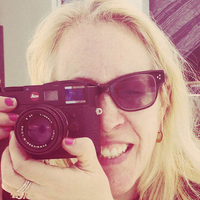On creating what doesn't exist
Prelude
Founded in 2020 in Berlin, Germany, by Ackeem Ngwenya and Shariff Vreugd, Reframd is a pioneer in eyewear products designed especially for people with low and wide nose profiles. At the core of their values is an unwillingness to accept the world as it is and the belief that we can drive the change we want to see. Reframd began with a personal frustration of its founders finding fitting glasses and avoiding wearing any because of how they sat on their noses. It turns out that most off-the-shelf or ready-to-order glasses are designed around “Caucasian” nasal features, i.e., narrow and high nasal bridges. Reframd designs and produces custom-fit eyewear products driven by each customer’s facial measurements. Reframd recently launched a Kickstarter campaign to create an APP for their virtual try-on (VT-O).
Conversation
On creating what doesn't exist
Designers and Reframd co-founders Ackeem Ngwenya and Shariff Vreugd on trying to solve problems with your work, the importance of belief and imagination, and accepting failure as a way to learn.
As told to Rona Akbari, 1517 words.
Tags: Design, Business, Collaboration, Identity, Process, Success, Failure, Business.
What makes good design?
Sharief Vreugd: I don’t really have a design background. I think good design is something that is accessible to many people and something that helps people as well.
Akeem Ngwenya: What some people think designers do is sit around and make things pretty, right? Maybe that is one aspect of design, but I think what makes good design is that it should solve a problem. It should try to make the world better than it currently is. And in our case, that is the intention to make the world a bit more inclusive than it currently is. I think that is what good design should do.
Not that making things prettier is not a good thing to do. I’m sure there’s quite a big market for things that are prettier than they were before, and that is perfectly fine. But there are so many problems or opportunities in the world where there’s a need for design or creative thinking to come up with solutions that respond to those situations in a way that has not been thought of before. Or maybe it was thought of before, but has not been made better. I think that is where design, and creativity, has the most impact. It comes up with solutions where solutions don’t yet exist. It’s not just design, it’s creativity in general. Design is a function of that.

Have you always wanted to follow entrepreneurship? Or was this a new project that you took on?
Akeem: Personally I’ve not thought of myself as following that path. That is partly due to how and where I grew up [in Malawi and South Africa], where entrepreneurship is not really something that someone aspires to be. Even though entrepreneurship is quite a part of society, in the sense that you always have people selling tomatoes or something on the streets, it’s not codified as such. So you don’t aspire to become a tomato seller or something. It’s just something that happens because maybe there are no other options. So this in a sense happened, I guess, by chance, by accident. It’s a good accident to happen. It makes us independent and self-reliant. I don’t think it’s so much about being your own boss, but setting your own path in the world where you can work on something that matters to you personally, something that you can see start from the beginning and achieve a particular end. Entrepreneurship gives us that option.
I think that’s amazing because you’re imagining a future that doesn’t exist yet. I’m wondering, what is your relationship to imagination? Inherently as an entrepreneur, you have to be future-oriented.
Akeem: I think you said it perfectly. In the sense that being an entrepreneur requires imagination. You have an idea, maybe. We have an idea. Let’s say, “Okay, I think this could be something that might solve a particular problem or be good for society.” But an idea itself is just that. You have to put it into practice. And you, as an entrepreneur, you try to find ways and means to bring about that reality, either in the future or the reality in your head.
Sharief: I think Akeem is right. In a way, you need to believe in the product. And it’s maybe only in the beginning in your head. At some point, you have to try to sell that vision to people. But since it doesn’t exist or it’s just an idea, you really have to believe in this imaginary thing that doesn’t exist at all. I think believing is one of the most important aspects of an entrepreneur. Of course, you also have to work hard. With belief, I also think being optimistic is part of it. Because if you look at the numbers, the majority of startups, they just fail, but why do so many people still start companies? It’s because they believe in something.
Akeem: Yeah. That’s perfectly said. And with regards to going against the stream, given that 9 out of 10 startups fail, to really be an entrepreneur in practice is to embrace failure, the possibility of failure, but still not be afraid or deterred by that possibility of failure. And that can only come about if you have the conviction that you are working on something that you think is going to work and make a difference. And that is imagination and dreams.

How do you deal with the emotional roller coaster of that?
Sharief: I talk a lot with Akeem, of course. I think it’s important to have people around you that you can talk to. Many people actually don’t understand it because they live a different life. But if you can find yourself a small circle of people that is willing to listen to you, I think that’s very helpful because there’s so much going on and it’s not good to crop all those emotions, leave it inside of you. I think speaking helps me a lot.
Akeem: Starting a business is not a short term goal. So you have to have a long-term mindset, and it’s pretty much like I’d imagine trading on the stock exchange. If you’re going to trade depending on the performance of day-by-day, you’re probably going to lose money almost every hour. We don’t have linear progression or linear growth all the time, so you have to zoom out. Look at how things are developing. Look at where you as a start-up were six months ago, compared to where you are now. And then in that respect, you can say, “Okay. Today might be a shitty day, but hey, where was I six months ago?”
What do you consider failure, and how can you find success in it?
Sharief: Failure is the way people grow. If you don’t fail, that means you don’t try new things. And if you don’t try new things, it means you don’t take any risks. In order to learn, you need to try and fail. I think you learn the most things from things that actually don’t go very well. When you look at entrepreneurship, people always celebrate successful entrepreneurs, but all that success comes from a past. And most likely, there are a lot of failures in the past. We don’t really acknowledge them, but it’s so important to not be afraid to make mistakes. Failure is important. It’s normal and okay to fail. As long as you learn from your mistakes.
You’re running a Kickstarter campaign for a Reframd app. What makes a successful campaign in your eyes?
Sharief: I think it’s important to have a community that you can rely on. I think community is definitely something that is really important, but also you have to think of the target audience, the people that are on Kickstarter as well. Do you think those people will be interested in your project as well? So, yeah, I think it’s a mix of those two.
**Akeem: ** There definitely needs to be a community. But of course, you can’t just have the community… You’ll find that any single solution that you have to raise funds might or might not work, so you need more than one approach.

If someone feels compelled by this story, what is something you would want to share with them or ask them?
Akeem: I think maybe at the end of it would be, of course, to support our project. And if not, then share our campaign. But I think perhaps what’s more important is trying to think of where you as an individual pledge your money in any Kickstarter campaign, not just ours. What is the impact that pledge is having? I think most Kickstarter projects are independent projects and they are probably run by groups like us that are also coming from relatively nothing. I think for the most part you, as an individual, pledging towards the Kickstarter campaign, have such tremendous power to influence a product coming into reality. And so you need to ask: What is the product or the project or the artwork that you are pledging towards trying to achieve in the world?
You, as an individual, have tremendous power to have to shape society in how you pledge and where you buy your products outside of Kickstarter. Whether you buy organic or whether you buy from your local shop around the corner, or whether you buy from Amazon, you as an individual, your purchasing power is quite important. And we should all use that to the maximum benefit of making the world a bit better.
Ackeem Ngwenya and Shariff Vreugd Recommend:
Starting with Why by Simon Sinek
The documentary Coded Bias
Afropean: Notes from Black Europe by Johny Pitts
biking
- Name
- Ackeem Ngwenya and Shariff Vreugd
- Vocation
- Designers, co-founders of Reframd
Some Things
Pagination



